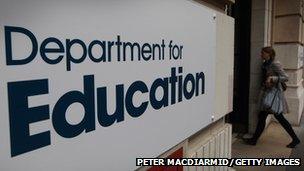'Millions wasted' on inefficient academies scheme
- Published

The DfE says discussions are under way to resolve the accounting problem
Millions of pounds were wasted on England's rapidly growing academies programme because of over-complex and inefficient funding systems, MPs say.
A Public Accounts Committee report describes a system peppered with overspends and errors, but subject to little oversight.
It urges the Department for Education to tighten its financial grip on these privately run but state-funded schools.
The government said the report ignored the programme's "huge success".
Independent of local councils, academies are privately run schools that are funded by the state and directly accountable to the Department for Education.
The report points out it is the department's responsibility to ensure that taxpayers' funds are used wisely at academies.
'Playing catch-up'
Committee chairman Margaret Hodge said inefficient funding systems and poor cost control had driven up the cost of the programme.
"Of the £8.3 billion spent on academies from April 2010 to March 2012, some £1 billion was an additional cost which had to be met by diverting money from other departmental budgets.
"Some of this money had previously been earmarked to support schools struggling with difficult challenges and circumstances. £350 million of the extra £1 billion represented extra expenditure that was never recovered from local authorities."
Part of the overspend will be due to the increase from about 200 open academies in April 2010 to more than 2,886 in March 2012.
But the committee warns the "oversight of academies has had to play catch-up with the rapid growth in academy numbers", and heard concerns of money being allocated twice in some cases.
The report also notes that much of the extra costs of the programme were met out of existing budgets - most notably £95m from a fund previously earmarked for improving underperforming schools.
But it warns that because so many converters were high-performing schools, those that might have needed the extra financial help more had arguably lost out.
The report also warns that the present system makes it hard for the department to prove academies are not receiving more money than they should. Ministers are still unable to convince those interested that academies do not get more money than regular schools.
It says central government may be "too distant to oversee individual academies effectively", and suggests that things will get tougher as the programme expands further in the future.
"We are sceptical that the department has sufficient resources to properly oversee the expanding programme, especially as schools now joining are less high-performing and may require greater oversight and scrutiny."
It notes that the number of central staff overseeing academies' finance and assurance has doubled since May 2010, while the number of academies has increased tenfold.
It points to some "serious cases of governance failure and financial impropriety in academies" that went undetected by the department's own monitoring.
It warns that oversight systems have not kept pace with academy numbers and expresses concern that only now - more than two years into the expansion programme - has the department started to address value-for-money issues.
'Gung-ho attitude'
The committee also says there is too little public information about finances at individual academy level.
It calls on the department to publish school level expenditure, including per-pupil funding, for academies and to subject them to the same level of public scrutiny as experienced by regular state schools.
A DfE spokesman said the report failed to acknowledge "the significant progress that we have made in improving our systems.
"The academies programme has been a huge success. There are now almost 3,000 academy schools - more than 14 times as many as in May 2010 - with more than two million children now enjoying the benefits that academy status brings. The programme is proven to drive up standards. Sponsored academies are improving far faster than maintained schools.
"We make no apology for the fact that so many schools have opted to convert, and no apology for spending money on a programme that is proven to drive up standards and make long-term school improvements.
"The Department for Education has made significant savings in the last two-and-a-half years and has also set aside significant contingencies, which have been set against the growth in academies."
He added that the costs of converting academies have already fallen by more than half per academy and that further savings were expected in the future.
Martin Johnson, deputy general secretary of the Association of Teachers and Lecturers, said: "It's hard to know which is worse, the lack of financial transparency in academies or the government's failure to check for and identify instances of misuse of funds.
"We are appalled by the gung-ho attitude of ministers to ensuring value for money for children, parents, schools and tax-payers: they don't know whether the academies programme is value-for-money and have no plans to find out."
- Published22 November 2012
- Published27 January 2011
- Published17 July 2012